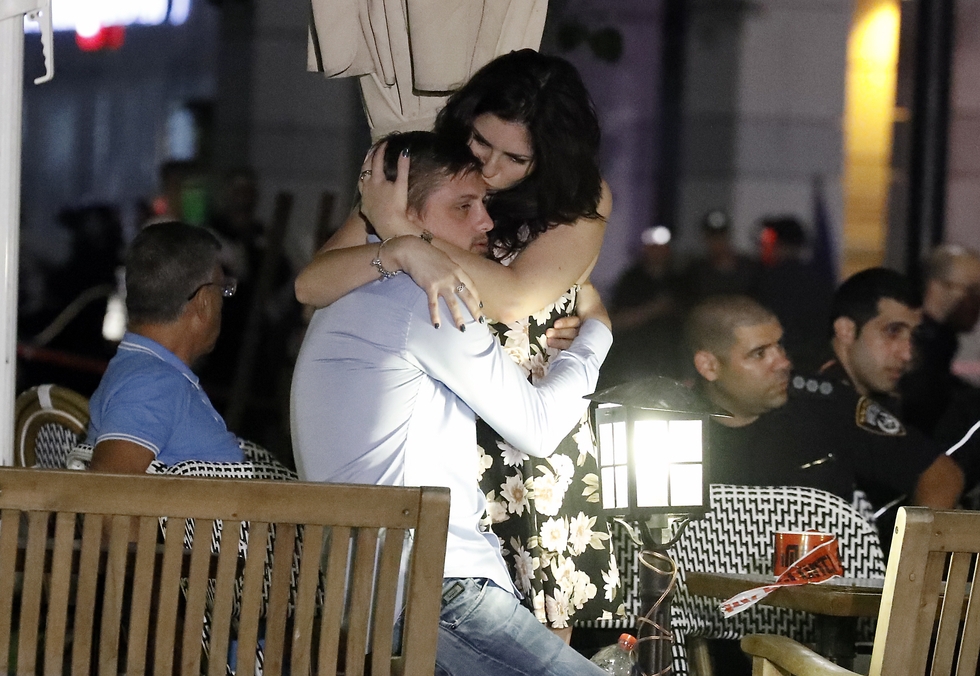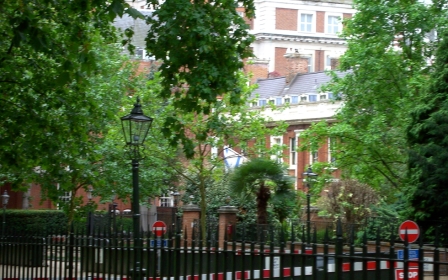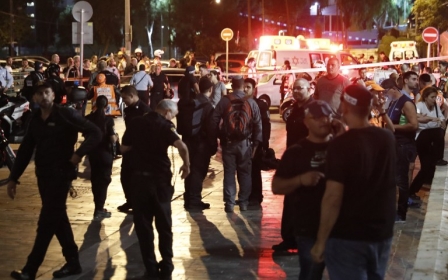Israel revokes Ramadan permits after 'cold-blooded' Tel Aviv attack
Benjamin Netanyahu described an attack in Tel Aviv by two Palestinian gunmen as a 'cold-blooded terrorist murder'

Israelis embrace following a shooting attack at a shopping complex in Tel Aviv on 8 June 2016 (AFP)
Published date: 9 June 2016 13:39 BST
|
Last update: 8 years 5 months ago
Israel clamped down on Palestinian movements and boosted security on Thursday after Palestinian gunmen shot dead four people at a popular Tel Aviv nightspot, the deadliest attack in a months-long wave of violence.
Surveillance video seemingly from the moment of the attack that spread online showed the two assailants, dressed in black suits and ties, calmly walking into a cafe before pulling out guns and opening fire on its terrace.
Most patrons fled in panic, though some fought back at the cafe at Sarona Market in Israel's commercial capital.
At one point, one of the attackers violently threw a handgun to the ground as two victims lay motionless on the terrace.
Five people were wounded in addition to the four killed.
The cafe remained open on Thursday and was about half full in the afternoon, despite widespread shock among Israelis over the attack.
On the grass nearby, dozens of teenagers sat in a circle playing guitars and singing: "Don't be afraid, if you are alone, be strong."
Officials said they were suspending entry permits for more than 80,000 Palestinians during the holy Muslim month of Ramadan in a move that was likely to further stoke tensions.
Israel was also sending two additional battalions -- hundreds more troops -- into the occupied West Bank.
Those killed were all Israelis, identified as Ido Ben Aryeh, 42, Ilana Nave, 39, Michael Feige, 58, and Mila Mishayev, 32, police said.
They said one of the attackers was arrested, while the other was wounded by gunfire and had undergone surgery.
They were identified as Khaled Mohammad Makhamrah, 22, and his cousin Mohammad Ahmad Makhamrah, 21, both from the Hebron area in the West Bank.
Prime Minister Benjamin Netanyahu visited the scene after what he called the "cold-blooded terrorist murder".
"We discussed a range of offensive and defensive steps which we shall take in order to act against this phenomenon," Netanyahu's office quoted him as saying.
"There will be intensive action by the police, the army and other security services, not just to catch every accomplice to this murder but also to prevent further incidents."
The shooting serves as a first major test for new hardline Defence Minister Avigdor Lieberman, sworn in on 30 May and who has in the past threatened severe action against Palestinian "terrorists."
He also visited the scene on Thursday and ordered lunch at the cafe where the attack occurred, promising action but without giving details.
Israel's security cabinet met later the same day.
A spokesman for Hamas, the Palestinian movement that governs the Gaza Strip and which is also present in the West Bank, called the attack a "heroic operation".
It was not yet clear if the attackers were acting alone of as part of a larger plot.
Ramadan measures
One of Israel's first responses was to revoke tens of thousands of Palestinian entry permits.
COGAT, the defence ministry unit which manages civilian affairs in the West Bank, said that 83,000 Palestinians would be affected.
The measures included freezing permits for 204 relatives of one of the alleged attackers.
Israel's army locked down the Palestinian town of Yatta, where the attackers were from, with soldiers patrolling and stopping cars as they entered and exited.
The shooting drew international condemnation, including from the United States and European Union.
The UN special coordinator for the Middle East peace process, Nickolay Mladenov, said "all must reject violence and say no to terror".
"I am also shocked to see Hamas welcome the terror attack," he said in a statement.
Stalled peace efforts
Violence since October has killed at least 207 Palestinians, 32 Israelis, two Americans, an Eritrean and a Sudanese.
Most of the Palestinians killed were carrying out knife, gun or car-ramming attacks, according to Israeli authorities.
Others were killed in clashes with security forces or by Israeli air strikes in the Gaza Strip.
The violence has steadily declined in recent weeks, though attacks have continued.
Shooting attacks have been rare, though Tel Aviv has seen two other major incidents this year.
In March, as US Vice President Joe Biden visited, a Palestinian went on a stabbing spree along the Tel Aviv waterfront, killing an American tourist and wounding 12 people.
On 1 January, a Palestinian-Israeli killed three people in a rampage in Tel Aviv.
Many analysts say Palestinian frustration with Israeli occupation and settlement-building in the West Bank, the complete lack of progress in peace efforts and their own fractured leadership have fed the unrest.
Israel says incitement by Palestinian leaders and media is a leading cause of the violence.
Last week in Paris, representatives from 28 countries, the Arab League, European Union and United Nations met to discuss ways of restarting Israeli-Palestinian peace efforts.
Negotiations have been at a complete standstill since a US-led initiative collapsed in April 2014.
At the Tel Aviv cafe on Thursday, Simon and Keren Bar said they considered themselves lucky to be alive.
"We were supposed to be here last night," Simon Bar said. "We planned to be here and then we changed our minds."
They were heartened by the fact that the cafe was so busy, the morning after the attack. "We thought it would be empty but thought it was important to come," he said.
New MEE newsletter: Jerusalem Dispatch
Sign up to get the latest insights and analysis on Israel-Palestine, alongside Turkey Unpacked and other MEE newsletters
Middle East Eye delivers independent and unrivalled coverage and analysis of the Middle East, North Africa and beyond. To learn more about republishing this content and the associated fees, please fill out this form. More about MEE can be found here.




